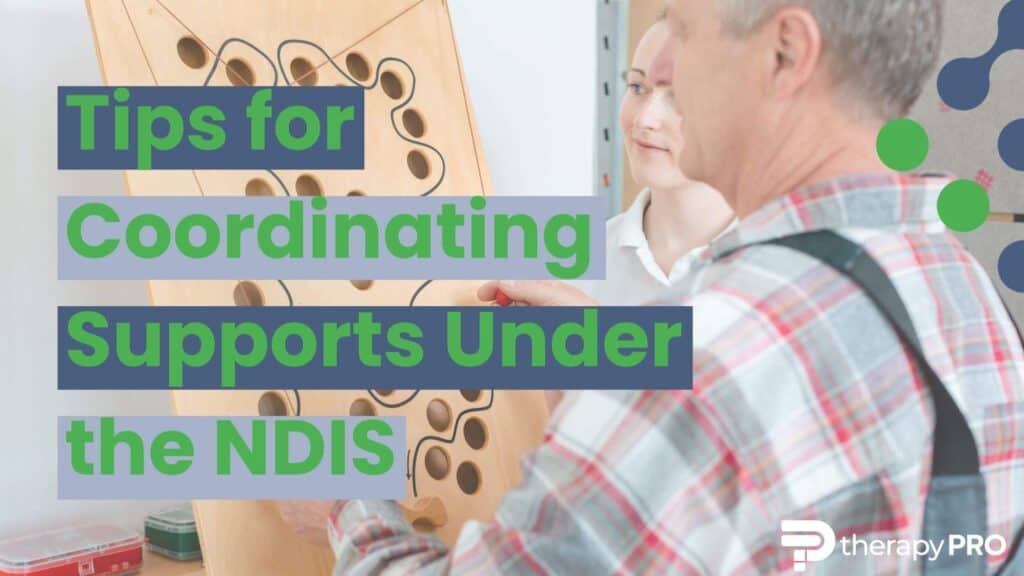Tips for Coordinating Supports Under the NDIS
Coordinating supports under the NDIS can be a challenging process, but working with a multidisciplinary therapy provider can simplify and enhance your experience.
This article shares practical tips on how to effectively coordinate your supports, ensuring you receive the comprehensive and coordinated care that meets your unique needs.
Understanding Multidisciplinary Care
Multidisciplinary care involves collaboration between various therapy disciplines, such as psychology, occupational therapy (OT), social work, positive behaviour support (PBS), and speech therapy.
This approach ensures that all aspects of a participant’s well-being are addressed.
Here’s how multidisciplinary care can benefit NDIS participants:
1: Holistic approach
Different therapies work together to address various aspects of a participant’s needs, creating a more holistic care plan.
2: Integrated treatment plans
Therapists collaborate to develop integrated treatment plans, ensuring consistency and avoiding conflicting recommendations.
3: Efficient communication
A single provider with multiple disciplines can streamline communication between therapists, reducing the burden on participants.
Common Challenges in Coordinating Supports
Navigating the NDIS System
One of the primary challenges NDIS participants face is understanding and navigating the complexities of the system.
The many rules, procedures, and a tonne of paperwork can be overwhelming, making it difficult to effectively manage and access needed supports.
Dealing with Multiple Providers
Working with different providers for various therapies can lead to fragmented care.
This can often result in communication issues, as each provider may not be fully aware of the interventions and goals set by others.
The lack of coordination can cause confusion and hinder the effectiveness of the overall support plan.
Ensuring Consistency of Care
Another significant challenge is maintaining consistency of care across multiple providers.
Aligning all therapists with the participant’s goals and needs can be difficult, especially when they operate independently.
This can result in disjointed therapy experiences and a lack of cohesive progress towards the participant’s objectives.
By recognising these challenges and taking steps to address them, such as choosing a multidisciplinary provider and centralising your support, you can improve the coordination and effectiveness of your therapy.
Practical Tips for Effective Coordination
1: Choose a Multidisciplinary Provider
Opt for a provider that offers multidisciplinary services. This ensures seamless coordination between different types of support and simplifies communication, as all services are managed from one central point within one team.
At Therapy Pro, we offer a range of therapies including psychology, OT, social work, PBS, and speech therapy, ensuring comprehensive and coordinated care.
2: Leverage Experience with the NDIS
Work with providers experienced in navigating the NDIS. They can help streamline your care plan, ensure compliance with NDIS requirements, and maximise your funding.
3: Centralise Your Support
Having a single point of contact, or working with a case manager or support coordinator who can manage your various therapies, can help you manage all your appointments. This person can help schedule appointments, monitor progress, and ensure that all therapists are working towards common goals.
4: Regularly Review Your Support Plan
Schedule regular reviews of your support plan with your therapy team. This helps to adapt to changing needs, address any new challenges, and keep your plan aligned with your goals.
5: Utilise Planning Tools and Resources
Use tools like scheduling apps or planning guides to keep track of appointments, progress, and goals. These tools can help you stay organised and ensure that all aspects of your support are well-coordinated.
For any support coordinators, head on over to our blog about support coordinator productivity tools for a run down of some useful apps and programs to help you make the best use of your time!
Real-Life Example of Multidisciplinary Support
Imagine a participant, Sarah, who initially sought therapy for anxiety. During her sessions, her psychologist noticed that her anxiety was related to sensory processing issues and daily living challenges.
The psychologist referred Sarah to an occupational therapist for further assessment.
The OT developed strategies to manage her sensory difficulties, which in turn helped reduce her anxiety.
This coordinated approach between psychology and OT provided Sarah with comprehensive support that addressed all her needs effectively.
Consider this gold star standard: the OT and psychologist both work within the same organisation and can communicate about Sarah and her unique needs to ensure a completely holistic approach to her care and management of NDIS funding.
Wrapping Up
Coordinating supports under the NDIS doesn’t have to be overwhelming.
By choosing a multidisciplinary provider with NDIS experience, centralising your support, and regularly reviewing your plan, you can ensure that your care is well-coordinated and effective.
If you or someone you know needs help managing their NDIS supports, consider working with a multidisciplinary provider like Therapy Pro to achieve better outcomes and enhance overall well-being.
Tell us what you’re looking for and our customer support team will be in touch:




